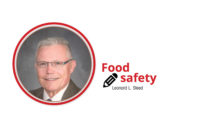Managing snack and bakery recalls and traceability to comply with FSMA

If your food safety plan has identified critical control points and/or preventive controls per your hazard analysis, the FDA’s Food Safety Modernization Act (FSMA) requires you to have a documented recall program. The FDA can issue a public notification for a mandatory recall and notify geographic consignees selling the violative product if illnesses have already occurred or they believe your recall is not effective. The Reportable Food Registry (RFR) squarely puts the responsibility for initiating a recall on the manufacturing firm to prevent an actual or potential Severe Adverse Health Consequences or Death to Humans or Animals event when the firm’s products have been distributed and are no longer under your control. The electronic reporting through the RFR portal must done within 24 hours after your decision that these products need to be recalled or withdrawn from commerce for public health reasons. A regional FDA recall coordinator will assist your firm during a recall, including reviewing your recall strategy and effectiveness checks prior to termination of the recall.
The FDA prefers that the manufacturing firm perform the recall and typically only intervenes if that firm is slow on recall decision-making or if the recall efforts are ineffective. The FDA also expects companies to make every effort to remove unsafe food from the marketplace in the shortest time possible. This means there can be serious issues if your distribution contacts are not up-to-date; language issues are not identified prior to the recall; and retail-level personnel do not fully understand the importance of a recall notification requiring an immediate action. The completion of a successful recall requires defined responsibilities, including disciplined execution using reliable information on raw materials, distribution channels and retail contacts (even to the consumer level) if the public health threat is determined urgent.
Do not wait for a real recall or voluntary withdraw to test your company’s recall/traceability capability, identify gaps, and confirm accurate and reliable distribution records and retail contacts. This testing should be done in advance to ensure you are prepared when a recall or voluntary withdrawal happens.
Recalls can be very expensive, disruptive and involve crisis management consultants through your insurance provider with ongoing status reports to the FDA or state contacts on recall effectiveness. Preparation through crisis management testing of your recall program and using your internal audit program to confirm that procedures are understood will confirm your capability to perform an effective recall. Your recall strategy should be prepared ahead of time. You should know how and where your products are distributed to identify any unforeseen gaps or missing information that could impact the effectiveness of your recall. Your recall strategy should include pre-prepared template forms recommended by the FDA guidance documents such as the Model Press Releases, Effectiveness Check Letters/Questionnaires/Return Response Form, and other reporting documents needed to inform the FDA or state coordinators that all efforts were made to prevent usage of violative product. A thorough review of your recall and traceability program and your ability to remove product efficiently from commerce will provide internal and external confidence that regulatory requirements will be met and improvement when gaps are identified.
Looking for a reprint of this article?
From high-res PDFs to custom plaques, order your copy today!







